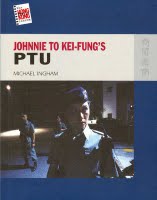
Johnny To's - PTU

Johnny To's - PTU
PTU is a surprising choice in the ongoing The New Hong Kong Cinema Series. Most of the other films previously covered are certifiable classics such as The Killer, Center Stage, Ashes of Time, A Better Tomorrow, Zu: Warriors from Magic Mountain or A Touch of Zen, while very few cinema fans would likely even rank PTU among To’s top five films. But the author argues that PTU is a highly underrated film and a fine representation of To’s recent work and I would certainly agree with his assessment.
Much of To’s filmography from 1980 to 1996 felt very much like director for hire work in a number of various genres – comedy (The Happy Ghost 3, The Seven Year Itch, The Eighth Happiness, The Fun, the Luck and the Tycoon), drama (All About Ah-long, Loving You, A Moment of Romance 2), Stephen Chow vehicles (Justice My Foot, The Mad Monk) and action (The Heroic Trio, The Executioners, Casino Raiders 2). There was no identifiable To signature to these films and in truth nothing to prepare one for his future work, but clearly lurking within him was an auteur in waiting. Looking back now, the first film of his which strikes me as a Johnny To film was the terrific fire fighting film Lifeline in 1997 in which he began to explore some of his often used themes of group dynamics and group heroism. After this he formed Milkyway and set upon his series of lean exquisite crime films that has led to him being ranked as perhaps Hong Kong’s top current director and also receiving worldwide recognition.
As To makes clear in interviews, PTU was made for his own pleasure with no real eye toward the box office (which is good since it made very little money!). He made it over a period of two years, occasionally gathering his crew together when they were available and filming some more. Some of this was due to a particular vision of how he wanted the film to look – empty and desolate in the heart of Tsim Sha Tsui – and for those who have visited Hong Kong, they should realize how difficult this was since that part of Hong Kong is extremely crowded. So To filmed only late on Sunday nights when he could get the look he desired. This book relates all this background and goes into detail on how To creates an imaginary TST by actually filming a number of the scenes elsewhere in Hong Kong but seamlessly integrating them in such a way as to make the viewer feel everything takes place within a few city blocks and over an 8 hour period.
Until To began churning these films out, Hong Kong crime films were generally thought of as over the top action films and labeled as Heroic Bloodshed – John Woo being the principal owner of this tag. With the exception of his first Milkyway film A Hero Never Dies, To dramatically pulls back from this label – his films are as much about inaction as about action and often he raises the viewers adrenaline only to lower it until an explosive cathartic climax – Expect the Unexpected, Exiled and PTU being the prime examples of this. Like Woo, To is a great admirer of some of the great French crime films of the 1950’s and 60’s – but To tracks much closer to their mood and intent than Woo does as these films are nearly all atmosphere and character with very little action actually occurring.
PTU is nearly all atmosphere as night falls on Tsim Sha Tsui and the streets empty of civilians and only the triads and the cops occupy this dark shadowy world. A gun goes missing, a murder takes place and a series of events is set in place that are co-incidental and yet inevitable. The smile that is traded between Mike (Simon Yam) and Lo (Lam Suet) at the end of the long night says everything about the absurdities of life and how luck can be your friend or it can be your enemy. Today though it was on our side, the smile says. Much was made of the police brutality in this film and To was criticized by some for seemingly giving it his stamp of approval – but I never read it that way. I think he is simply saying this is how it is out there in the real world and that there are rules between the cops and the triads and getting a little rough at times is within the acceptable rules of behavior.
PTU is a terrific film and Ingham’s book is
a fine analysis of it with a great eye to detail about the narrative, the
locations and the subtext. He also gives the reader a lot of information
about the HK Police and its make-up and interestingly he mentions a real
life case of murder and police corruption that was very much the basis
for To’s film Mad Detective. Watch the movie; read the book.